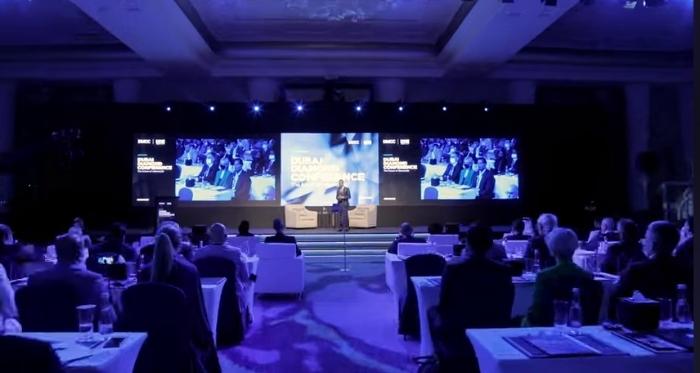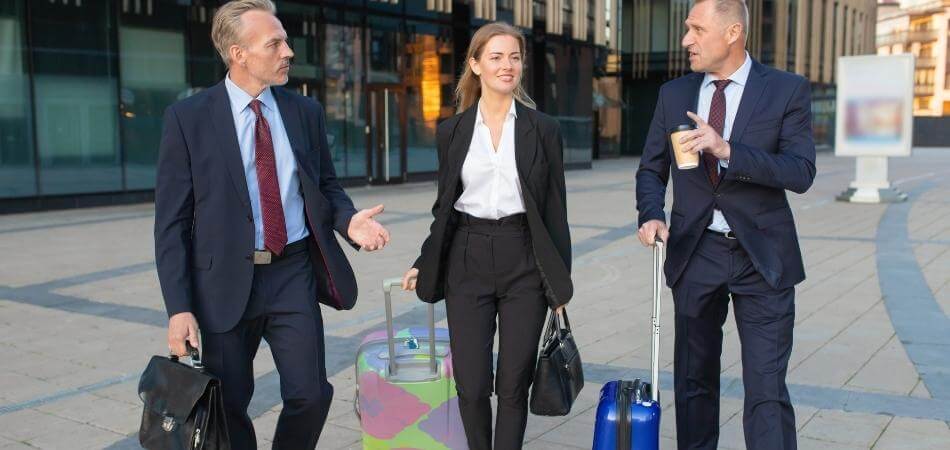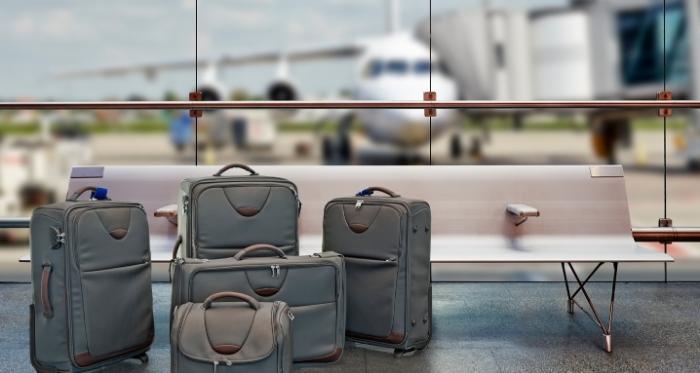In the professional sector, first impressions are everything. They can create meaningful connections, collaborations, and career advancement. While attire and body language often take the limelight in discussing professional presentations, another element is equally important but often overlooked: how you carry your belongings. So, do people bring backpacks to conferences?
The short answer is yes but with a caveat. Being uncluttered signals preparation and organization, crucial factors in making a memorable first impression. Whether you choose a business-style backpack or a tote bag to go with your handbag, your choices can be significant.
These choices help you manage your materials for the conference and free up your hand for greetings and opening doors. And let’s not forget face-to-face meetings are an essential aspect of many professional landscapes, making your entry just as crucial as your exit.
What Happens at a Conference?
Conferences are bustling hubs of innovation, learning, and networking. They bring together professionals, experts, and enthusiasts under one roof. Here’s a quick overview of what typically happens at such gatherings.
The primary purpose of conferences is to disseminate information and share knowledge. Attendees listen to keynote speeches and presentations, often from industry leaders or academic experts. These sessions provide new insights into best practices and can often spark creative solutions to problems.
Simultaneously, breakout sessions and workshops offer hands-on experiences. Here, attendees dive deeper into specialized topics, learning new skills or discussing emerging trends in smaller groups. These settings are more intimate, promoting direct interaction and engagement. Moreover, attendees of an in-person international conference can benefit from these sessions by gaining diverse perspectives and networking opportunities on a global scale.
Conferences offer valuable networking opportunities. From formal meet-and-greets to casual coffee breaks, attendees exchange contact information and discuss potential collaborations. The relationships formed can be enduring and beneficial, extending well beyond the conference itself.
What to Do at a Conference?
There can be both excitement and overwhelm when attending a conference. With a plethora of conference key activities, you should strategize your time effectively.
Here are some key activities to prioritize when attending a conference:
- Attend Keynote Speeches: High-profile speakers often headline these sessions. They provide valuable insights into industry trends and practices.
- Participate in Workshops: These are usually smaller and more interactive. Workshops are excellent venues for gaining practical knowledge and skills.
- Network Actively: Take advantage of coffee breaks and networking sessions. These are optimal times to meet peers and potential collaborators.
- Visit Exhibitor Booths: Companies and organizations showcase their products or services here. It’s a good opportunity to understand what’s new in your field.
- Join Breakout Sessions: These focus on specialized topics and involve group discussions. You can delve deeper into specific areas that interest you.
- Schedule One-on-One: If possible, set up individual meetings with people you want to connect with. It allows for more focused and meaningful conversations.
- Take Notes and Photos: Documenting your experiences is crucial. It helps you remember significant points and gives you something to refer back to.
Remember, the goal is to make the most of your time and opportunities. A well-planned approach can ensure you leave the conference enriched, both personally and professionally.
Do People Bring Backpacks to Conferences?
Attending conferences is essential to navigating the professional sphere, where how you present yourself can leave a lasting impression. The question of how to carry your belongings, particularly do people bring backpacks to conferences, arises. Here’s our take on the matter:
Yes, people bring backpacks to conferences, but there’s a catch. Choose a professional bag, opting for sleek designs over casual styles. Your backpack should complement your attire and signal your readiness for business interactions.
Inside the bag, organization is vital. Designate specific pockets for essentials like conference business cards, a notebook, and pens. This ensures you’re well-prepared, which reflects positively on you when meeting other professionals.
Lastly, the practicality of backpacks must be addressed. They allow you to keep both hands free, making interacting with others and handling materials easier. Plus, ergonomic designs can be more comfortable for all-day wear.
In summary, if selected thoughtfully, backpacks can be an excellent choice for conferences. Ensure your choice is professional, organized, and practical to make the best impression possible.
Types of Conferences You Should Bring a Backpack
When attending conferences, the type of different events can influence your choice of carry-on. Different professional settings call for different accessories, and a backpack may not always be the best fit. Let’s explore some conference types where a backpack would be particularly suitable.
Tech and Startup Conferences
These events are generally less formal and more focused on innovation. A tech-savvy backpack with compartments for gadgets is ideal. It not only serves your needs but also fits the conference ethos.
Academic and Research Conferences
Here, you’ll likely have a myriad of papers, notes, and perhaps even a laptop. A professional-looking backpack can keep you organized. Being neat and prepared lets you focus on absorbing new knowledge.
Outdoor and Adventure-Based Conferences
If the conference involves activities that are not in a typical indoor setting, practicality trumps formality. A durable, water-resistant backpack is crucial. It will protect your belongings while matching the conference’s adventurous vibe.
Trade Shows and Exhibitions
These events involve a lot of walking and collecting informational materials. A backpack frees your hands to interact with exhibitors. It also provides ample space for storing samples and brochures.
The choice to bring a backpack should align with the conference’s setting and expected norms. Always opt for a design that is as professional as it is practical, ensuring you make the most of your conference experience.
Perks of Bringing a Backpack to a Conference
Choosing the right bag for a conference can impact your overall experience. While traditional options like briefcases exist, backpacks offer unique advantages. Here are some benefits that might make you consider a backpack for your next conference.
Ergonomic Comfort
Backpacks distribute weight evenly across both shoulders. This ergonomic design minimizes physical strain, crucial for events lasting several hours. You’re less likely to feel fatigued, which boosts your engagement levels.
Hands-Free Interaction
Having both hands free enhances your networking game. You can easily exchange business cards or sip your coffee while chatting. It’s a minor but significant perk that aids in smooth interpersonal exchanges.
Improved Organization
Backpacks often come with multiple compartments tailored for gadgets, notebooks, and essentials. Having a designated place for each item eliminates clutter. You’ll appear more organized, leaving a positive impression on your peers.
Versatility
Many backpack designs now blend formality with function. You can easily transition from a conference setting to an informal meetup. Versatility like this adds value, as one bag serves multiple scenarios.
While the decision ultimately depends on the nature of the conference and your personal style, backpacks offer undeniable advantages. From ergonomics to organization, they can be a savvy choice for the modern professional.
Final Considerations
The professional arena places immense value on first impressions, shaping potential collaborations and career trajectories. While most discussions focus on attire and body language, the subtle detail of how we manage our belongings speaks volumes. So, do people bring backpacks to conferences?
The myriad advantages of backpacks, from ergonomic comfort to practical organization, make them a compelling choice for various conference types, whether tech-focused or academic. Their versatility aligns with professional gatherings’ formal undertones and networking sessions’ informal nuances.
As the modern professional seeks functionality and style, backpacks emerge as a practical yet sophisticated choice, reinforcing the importance of being well-prepared and uncluttered in the professional domain.








